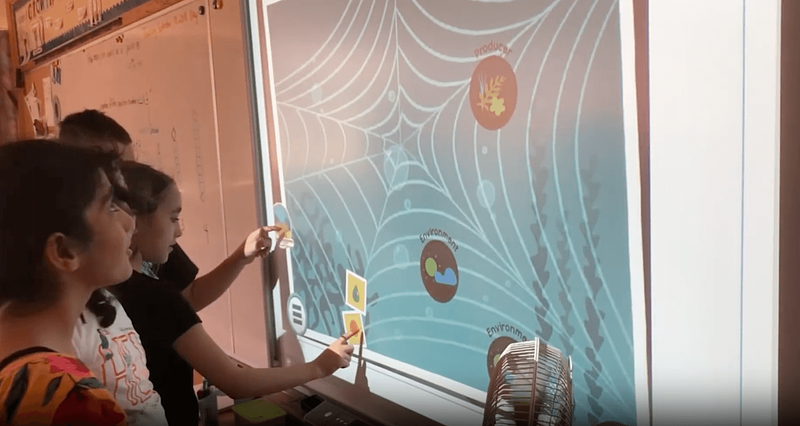1) Farmpreneur

Farmpreneur, an initiative of Farm 2 Food Foundation, mentors students to set up a school nutrition garden. The Farmpreneur curriculum focuses on 3 main strands:
- Nutrition: By encouraging young people to grow their own food, the experiential nutrition curriculum helps them better understand nutrition and adopt more local leafy vegetables and fruits into their diets.
- Science and Mathematics education: Through activities mapped to the science and mathematics syllabus of the state board, students learn in the nutrition garden with an activity-based approach.
- Entrepreneurship education: students get first-hand experience of farm entrepreneurship using local resources.
This project was created in India to address the problem of inadequate nutrition leading to poor health and poor academic outcomes. Lack of nutrition can lead to high student dropout rates, the school nutrition garden approach can simultaneously improve diet behaviours and academic performance.
"Involving young people in initiatives to green their schools and communities fosters a sense of ownership and responsibility towards the environment"
"At Farm 2 Food Foundation, we encourage young people to engage with their local food systems and explore entrepreneurship in farming. This empowers them to contribute towards building sustainable communities. By growing their own food, they not only reduce their carbon footprint but also gain a deeper understanding of where their food comes from and the environmental impact of various agricultural practices. Moreover, involving young people in initiatives to green their schools and communities fosters a sense of ownership and responsibility towards the environment. It instills leadership skills and cultivates a mindset of environmental stewardship, essential for addressing the challenges posed by climate change," explains Deep Jyoti Sonu Brahma, Co-Founder & Director of Farm 2 Food Foundation
School Nutrition Gardens also teach students about sustainability as it encourages healthy diets consisting of local fruits and vegetables and brings students closer to nature.
The Farmpreneur curriculum can be easily contextualised and implemented in any region. For more information, contact farm2food@gmail.com
2) Learning about Forests (LEAF)
LEAF advocates for outdoor learning and hands-on experiences to allow students to connect with nature and develop a deeper understanding of nature. LEAF educates students about the forested environment and inspires them to use their forests and appreciate what they do for us. Students learn about the importance of protecting and improving woodlands, which increases their level of environment maturity.

"Incorporating outdoor education into the formal and non formal curriculum not only enhances young peoples’ connection to nature but also empowers them to become informed and proactive leaders addressing climate change within their communities," explains Lee Wray-Davies, Director of Education, Foundation for Environmental Education.
LEAF provides free educational materials for teachers to get started, including lesson plans for students aged 6-15. Schools can also register with a LEAF National Operator to join the LEAF programme.
3) The Sustainability Compass
The Sustainability Compass is a systems thinking tool that supports educators with the integration of holistic sustainability into their curriculum. The Sustainability Compass uses four Compass Points (NEWS) - Nature, Society, Economy, and Wellbeing to identify systems elements and map their interconnections. This approach helps students to recognise their innate interdependence with their communities, thereby encouraging them to act to sustain them.
The Sustainability Compass is a copyrighted tool that is free to use in nonprofit education. You can also visit the Compass Education website which includes a free introductory course and hundreds of resources and lesson plans.
4) #Decarbonize Global Child Program
A free year-round program that allows teachers and students ages 5-19 to collaborate on environmental topics. Students in the programme engage in storytelling, blog posts, video production, art creation, interactive videoconference exchanges, and climate action. Students explore causes and effects of climate change and develop local solutions to take action.
For example, action projects in Brazil and India resulted in the installation of solar panels on the roofs of their school, and a project in the Philippines resulted in a school rooftop garden that provides all the vegetables needed for their canteen.
Schools can participate by registering for the #Decarbonize programme online.
5) League for Green Leaders

Students playing iBiome learning games
League for Green Leaders runs gamified online competitions for children aged 8-17 to encourage children to make eco-friendly choices which will turn into green-habits and nurture behavioural change towards sustainability.
Students interact with the award-winning iBiome learning games, building 12 virtual habitats, earning badges and gaining points by finishing their daily activities (both online and offline), and collaborating with teammates to compete for the top positions in the leaderboards. They track their daily eco-friendly choices and as their lifestyles become more sustainable, they will gain CO2e savings, and observe the collective impact they can make with other young green leaders.
To date, they have empowered over a thousand kids to save over 116 tonnes of CO2e.
This approach is a positive way to teach children about climate change while keeping them hopeful. The League for Green Leaders recognise that many students currently experience eco-anxiety so it is important to use a positive, optimistic approach to teach students how they can contribute to environmental sustainability.
If you are working on a climate education project, we want to hear about it! Submit your innovation to the Global Collection!




